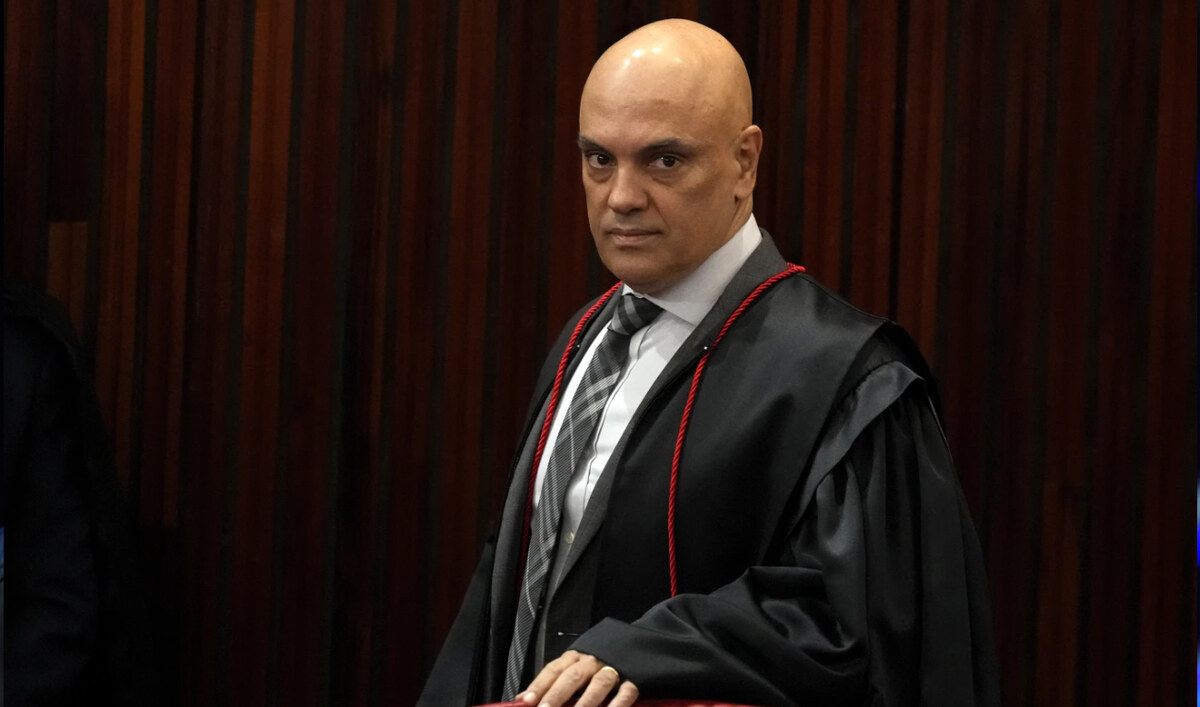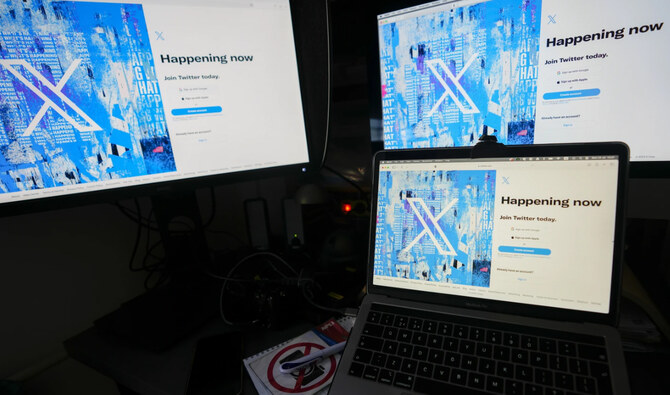SAO PAULO: It’s a showdown between the world’s richest man and a Brazilian Supreme Court justice.
The justice, Alexandre de Moraes, has threatened to suspend social media giant X nationwide in the coming hours if its billionaire owner Elon Musk doesn’t swiftly comply with one of his orders. Musk has responded with insults, including calling de Moraes a “tyrant” and “a dictator.”
It is the latest chapter in the monthslong feud between the two men over free speech, far-right accounts and misinformation. The deadline for compliance is fast approaching, and many in Brazil are waiting and watching to see if either man will blink.
What is the basis for de Moraes’ threat?
Earlier this month, X removed its legal representative from Brazil on the grounds that de Moraes had threatened her with arrest. On Wednesday night at 8:07 p.m. local time (7:07 p.m. Eastern Standard Time), de Moraes gave the platform 24 hours to appoint a new representative, or face a shutdown until his order is met.
De Moraes’ order is based on Brazilian law requiring foreign companies to have legal representation to operate in the country, according to the Supreme Court’s press office. This ensures someone can be notified of legal decisions and is qualified to take any requisite action.
X’s refusal to appoint a legal representative would be particularly problematic ahead of Brazil’s October municipal elections, with a churn of fake news expected, said Luca Belli, coordinator of the Technology and Society Center at the Getulio Vargas Foundation, a university in Rio de Janeiro. Takedown orders are common during campaigns, and not having someone to receive legal notices would make timely compliance impossible.
“Until last week, 10 days ago, there was an office here, so this problem didn’t exist. Now there’s nothing. Look at the example of Telegram: Telegram doesn’t have an office here, it has about 50 employees in the whole world. But it has a legal representative,” Belli, who is also a professor at the university’s law school, told The Associated Press.

In this file photo, taken on June 22, 2023, Brazilian Supreme Court Chief Justice Alexandre de Moraes arrives for a court hearing in Brasilia, Brazil. (AP/File)
Does a single judge really have that much power?
Any Brazilian judge has the authority to enforce compliance with decisions. Such measures can range from lenient actions like fines to more severe penalties, such as suspension, said Carlos Affonso Souza, a lawyer and director of the Institute for Technology and Society, a Rio-based think tank.
Lone Brazilian judges shut down Meta’s WhatsApp, the nation’s most widely used messaging app, several times in 2015 and 2016 due to the company’s refusal to comply with police requests for user data. In 2022, de Moraes threatened the messaging app Telegram with a nationwide shutdown, arguing it had repeatedly ignored Brazilian authorities’ requests to block profiles and provide information. He ordered Telegram to appoint a local representative; the company ultimately complied and stayed online.
Affonso Souza added that an individual judge’s ruling to shut down a platform with so many users would likely be assessed at a later date by the Supreme Court’s full bench.
How would de Moraes suspend X?
De Moraes would first notify the nation’s telecommunications regulator, Anatel, who would then instruct operators — including Musk’s own Starlink Internet service provider — to suspend users’ access to X. That includes preventing the resolution of X’s website — the term for conversion of a domain name to an IP address — and blocking access to the IP address of X’s servers from inside Brazilian territory, according to Belli.
Given that operators are aware of the widely publicized standoff and their obligation to comply with an order from de Moraes, plus the fact doing so isn’t complicated, X could be offline in Brazil as early as 12 hours after receiving their instructions, Belli said.
Since X is widely accessed via mobile phones, de Moraes is also likely to notify major app stores to stop offering X in Brazil, said Affonso Souza. Another possible — but highly controversial — step would be prohibiting access with virtual private networks ( VPNs) and imposing fines on those who use them to access X, he added.
Has X been shut down in other countries?
X and its former incarnation, Twitter, are banned in several countries — mostly authoritarian regimes such as Russia, China, Iran, Myanmar, North Korea, Venezuela and Turkmenistan.
China banned X when it was still called Twitter back in 2009, along with Facebook. In Russia, authorities expanded their crackdown on dissent and free media after Russian President Vladimir Putin sent troops into Ukraine in February 2022. They have blocked multiple independent Russian-language media outlets critical of the Kremlin, and cut access to Twitter, which later became X, as well as Meta’s Facebook and Instagram.
In 2009, Twitter became an essential communications tool in Iran after the country’s government cracked down on traditional media after a disputed presidential election. Tech-savvy Iranians took to Twitter to organize protests. The government subsequently banned the platform, along with Facebook.
Other countries, such as Pakistan, Turkiye and Egypt, have also temporarily suspended X before, usually to quell dissent and unrest. Twitter was banned in Egypt after the Arab Spring uprisings, which some dubbed the “Twitter revolution,” but it has since been restored.
Why is Brazil so important to X and Musk?
Brazil is a key market for X and other platforms. Some 40 million Brazilians, roughly one-fifth of the population, access X at least once per month, according to the market research group Emarketer. Musk, a self-described “free speech absolutist,” has claimed de Moraes’ actions amount to censorship and rallied support from Brazil’s political right. He has also said that he wants his platform to be a “global town square” where information flows freely. The loss of the Brazilian market — the world’s fourth-biggest democracy — would make achieving this goal more difficult.
Brazil is also a potentially huge growth market for Musk’s satellite company, Starlink, given its vast territory and spotty Internet service in far-flung areas.
Late Thursday afternoon, Starlink said on X that de Moraes this week froze its finances, preventing it from doing any transactions in the country where it has more than 250,000 customers.
“This order is based on an unfounded determination that Starlink should be responsible for the fines levied— unconstitutionally— against X. It was issued in secret and without affording Starlink any of the due process of law guaranteed by the Constitution of Brazil. We intend to address the matter legally,” Starlink said in its statement.
Musk replied to people sharing the earlier reports of the freeze, adding his own insults directed at de Moraes.
“This guy @Alexandre is an outright criminal of the worst kind, masquerading as a judge,” he wrote.
De Moraes’ defenders have said his actions have been lawful, supported by most of the court’s full bench and have served to protect democracy at a time in which it is imperiled.
In April, de Moraes included Musk as a target in an ongoing investigation over the dissemination of fake news and opened a separate investigation into the executive for alleged obstruction.

In this file photo, taken on March 9, 2020, Tesla and SpaceX CEO Elon Musk listens to a question at the SATELLITE Conference and Exhibition in Washington. (AP/File)
Will X appoint a new legal representative in Brazil?
X said Thursday in a statement that it expects its service to be shutdown in Brazil.
“Unlike other social media and technology platforms, we will not comply in secret with illegal orders,” it said. “To our users in Brazil and around the world, X remains committed to protecting your freedom of speech.”
It also said de Moraes’ colleagues on the Supreme Court “are either unwilling or unable to stand up to him.”
























